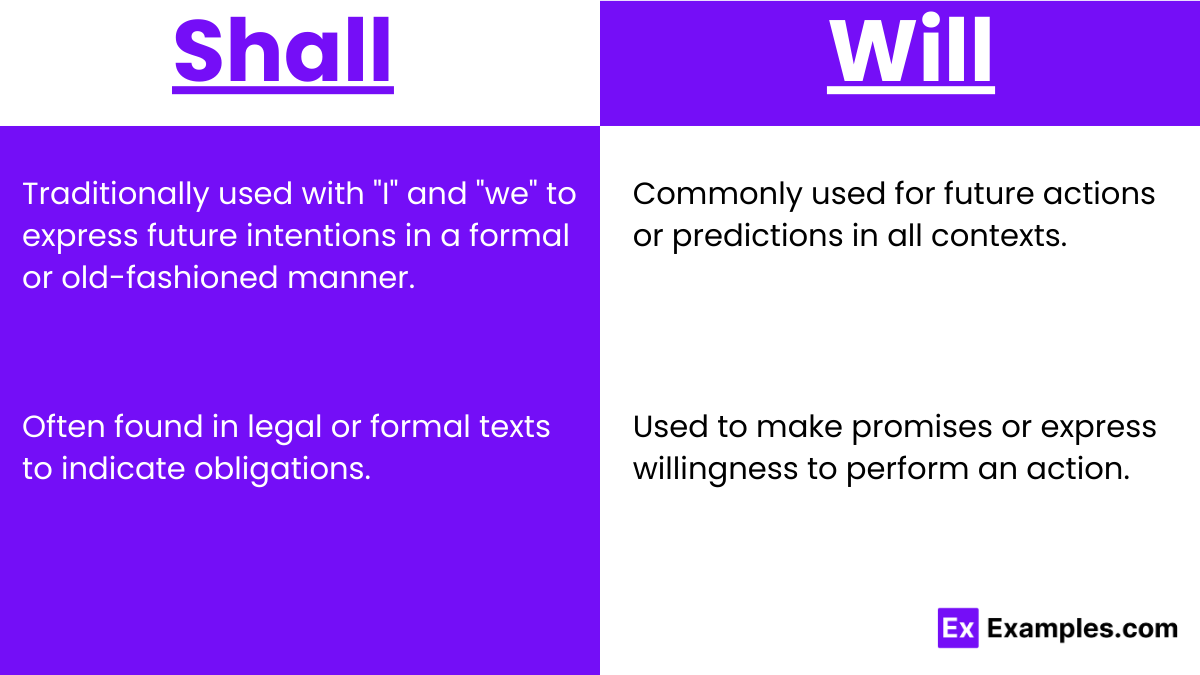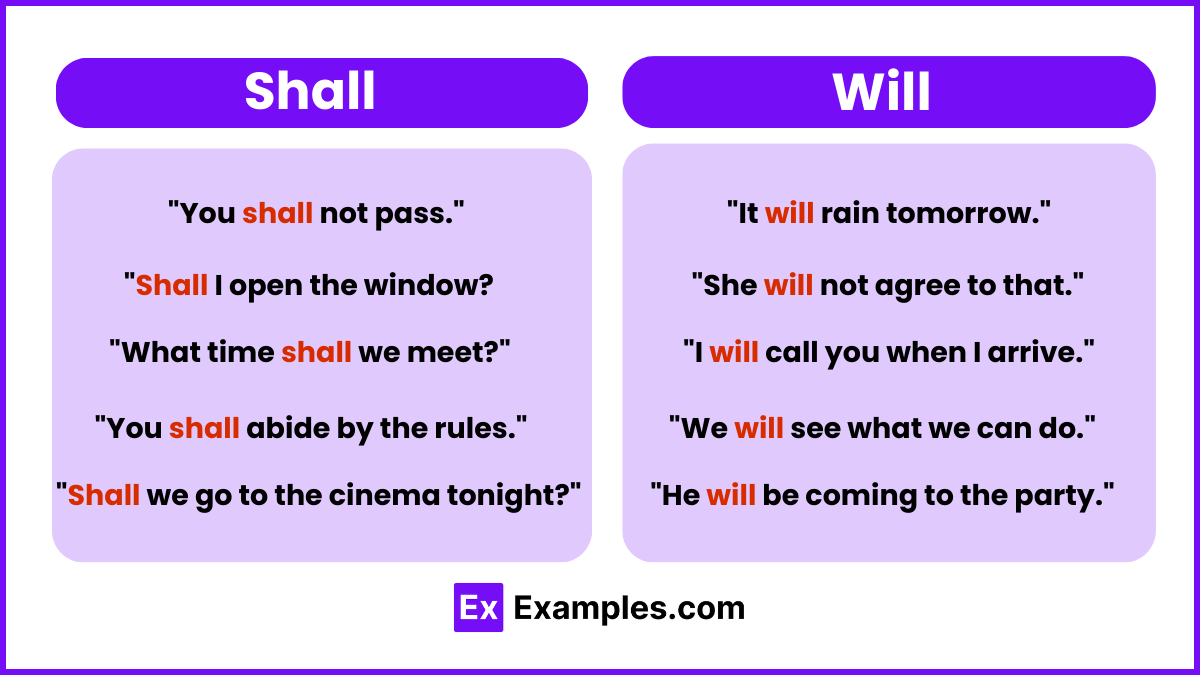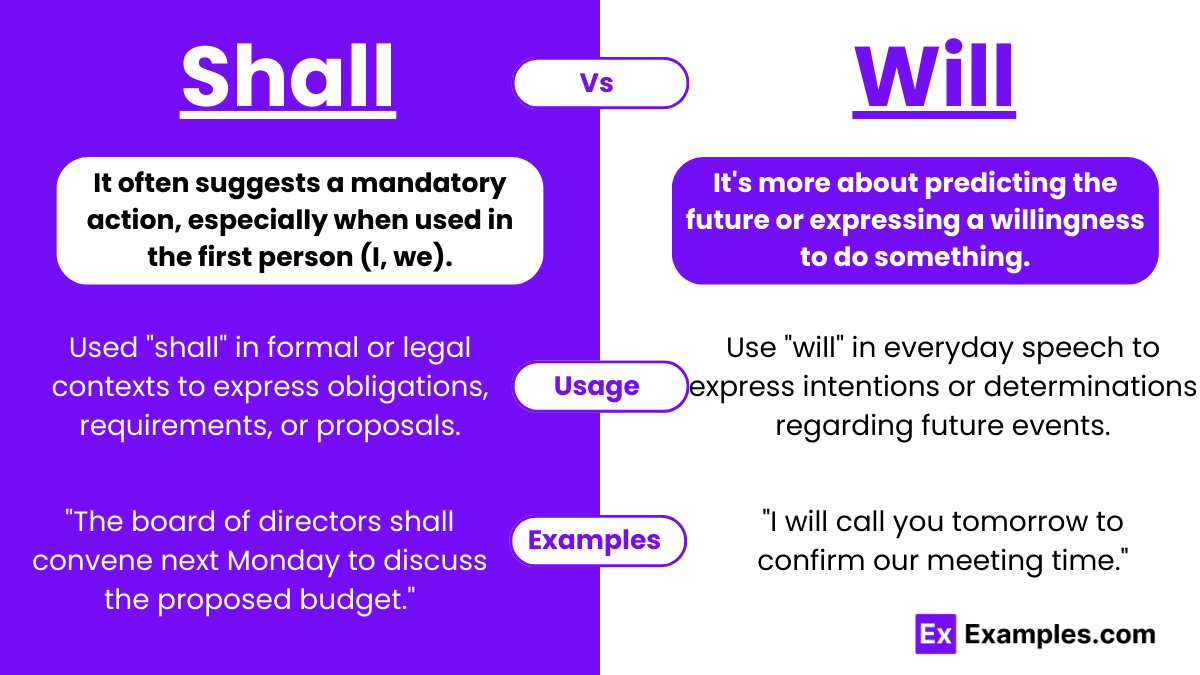Shall vs Will – Meanings, Difference, examples, Usage
“Will” and “Shall” are two words we often use to talk about the future, but they’re not exactly the same. “Shall,” though less common these days, has a formal tone and is sometimes used in legal contexts or to suggest a strong intention, especially with “I” and “we,” as in “We shall overcome.” “Will” is the go-to choice for most future intentions or predictions, like “I will call you later.” In this simple guide, we’ll explore how and when to use “will” and “shall,” helping you express your future plans with precision. Get ready to master the future tense with ease!
Shall and Will – Meanings
“Shall” and “Will” are modal verbs used in English to express future actions or intentions, but they carry nuanced differences in usage.
- Shall: “Shall” is used to indicate a strong sense of obligation, duty, or necessity, particularly in formal or legal contexts. It often suggests a determination or a mandatory action, especially when used in the first person (I, we).
- Will: “Will” is commonly used to express a future intention, decision made at the moment of speaking, or a likelihood or certainty. It’s more about predicting the future or expressing a willingness to do something.
Summary
“Shall” and “Will” are auxiliary verbs used for forming the simple future tense. Traditionally, “shall” is meant for the first person (I, we), while “will” is for second and third persons (you, he/she, they). However, in modern usage, this distinction is often overlooked, and both words are frequently used interchangeably to express future actions or intentions.
How to Pronounce Shall and Will
Shall: Pronounced as /ʃæl/ (shahl).
Will: Pronounced as /wɪl/ (wil).
Differences between Shall and Will
| Aspect | Shall | Will |
|---|---|---|
| Basic Use | Traditionally used to indicate future action, especially in formal or legal contexts. | Used to indicate future action, decisions, or predictions. |
| Formality | More formal and less common in modern everyday English, but still used in legal documents. | Common in everyday speech and writing, less formal than “shall.” |
| Intention | Often indicates an obligation or a strong assertion, especially in legal or formal contexts. | Indicates willingness or a simple future tense. |
| First Person Usage | In traditional English, “shall” with “I” and “we” suggests a simple future tense. | “Will” with “I” and “we” often suggests determination, promise, or voluntariness. |
| Second/Third Person Usage | Less common in modern English, can imply an instruction or command. | Used for all subjects to indicate future actions or predictions, with no command implied. |
| Questions | “Shall we…?” is often used to suggest offers or suggestions. | “Will you…?” is used to ask about decisions, intentions, or actions in the future. |
How to Remember the Difference between Shall and Will
- Think of “shall” as a more formal, often polite way to talk about the future, especially in questions or offers (“Shall we dance?”).
- “Will” is the go-to choice for future actions in modern English, carrying a straightforward, decisive tone (“I will call you later.”).
When to Use Shall and Will

Usage of Shall
Use “shall” in formal or legal contexts to express obligations, requirements, or proposals.
- Formal Offers or Suggestions: Used in formal contexts to suggest or offer.
- Legal or Regulatory Documents: Often found in legal or formal texts to indicate obligations.
- First Person Intentions (Traditional): Traditionally used with “I” and “we” to express future intentions in a formal or old-fashioned manner, particularly in British English.
Usage of Will
Use “will” in everyday speech or writing to express intentions, promises, or determinations regarding future events.
- Future Intentions or Predictions: Commonly used for future actions or predictions in all contexts.
- Decisions Made at the Moment of Speaking: Indicates spontaneous decisions made at the moment.
- Promises or Voluntary Actions: Used to make promises or express willingness to perform an action.
- Habitual Behavior or Characteristic Actions: Describes characteristic or habitual actions, sometimes indicating annoyance.
Shall and Will – Examples

Shall Examples
- The board of directors shall convene next Monday to discuss the proposed budget.
- Citizens shall comply with all traffic regulations while driving on public roads.
- In accordance with company policy, all employees shall undergo annual performance evaluations.
- I shall return before noon.
- We shall overcome the difficulties.
Will Examples
- I will call you tomorrow to confirm our meeting time.
- Don’t worry, I will help you with your homework after dinner.
- She will graduate from college next year with honors.
- He will complete the marathon, fueled by months of training and an unwavering spirit of perseverance.
- They will embark on an ambitious project to transform the city’s skyline, introducing sustainable and innovative designs.
Synonyms
| Shall | Will |
|---|---|
| Should | Intend to |
| Must | Plan to |
| Ought to | Aim to |
| Is to | Mean to |
| Is going to | Desire to |
Exercise
- We _________ meet at the café at 7 PM.
- She _________ assist you with your project.
- _________ you be attending the conference next month?
- They _________ need to submit their applications by Friday.
- I _________ go to the gym after work today.
Answers
- shall
- will
- Will
- shall
- will
FAQ’S
What is the legal difference between shall and will?
Shall often implies obligation or requirement, while will indicates future action or intent in legal contexts.
Which is the stronger word shall or will?
Shall is stronger, implying obligation or duty, whereas will suggests intention or decision.
What’s the difference between would and will?
Will expresses future actions or decisions; would is the past tense of will or indicates hypothetical situations.
What is difference between shall and should?
Shall implies obligation or formality, should suggests advice or recommendation.
Is it I said I will or would?
Use I said I would when referring to a past intention or a conditional statemen


